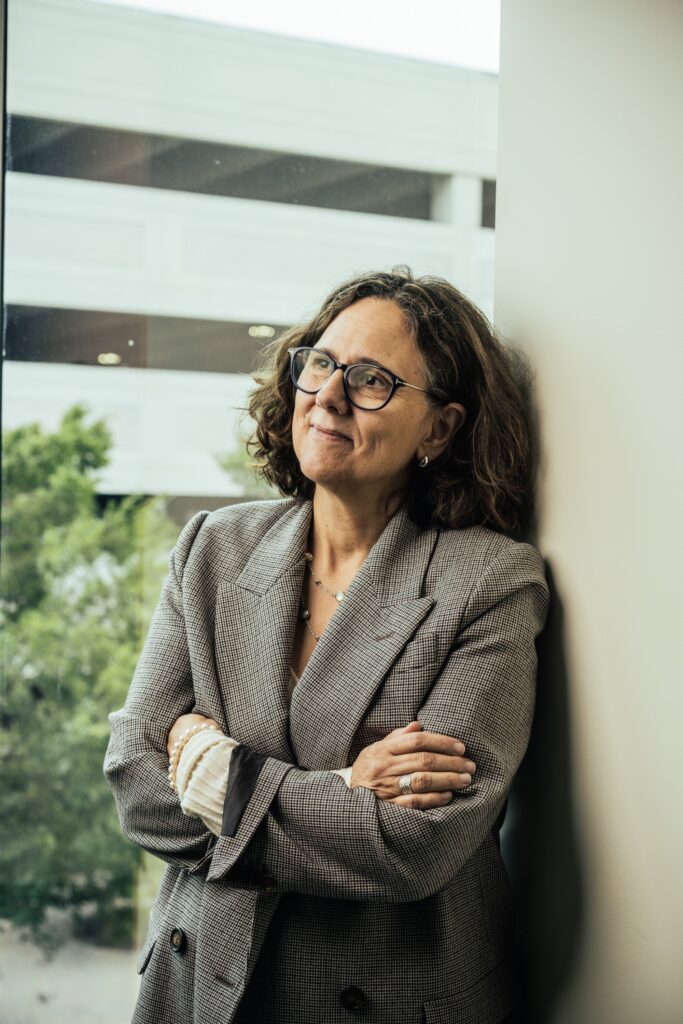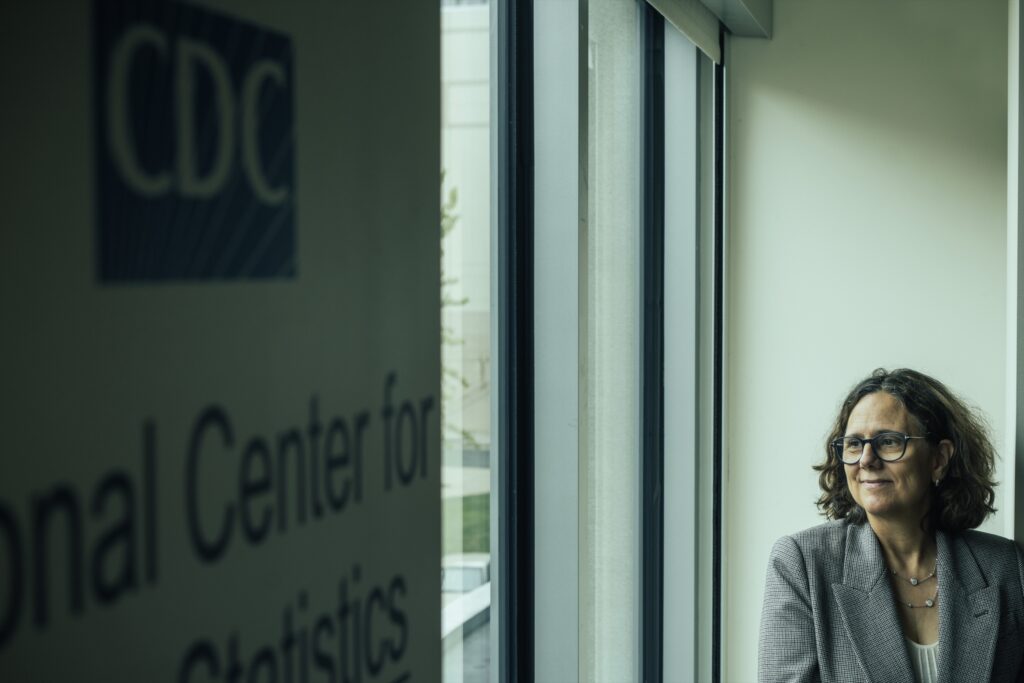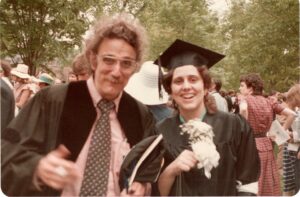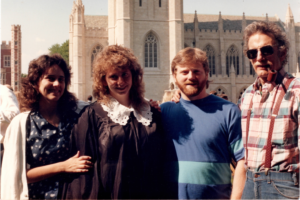Digging into data for nutrition know-how
CDC expert Cynthia Ogden ’83 credits lessons learned through liberal arts education

Story by Rhea Hirshman
Portraits by Stephen Voss
Throughout a 30-year career at the Centers for Disease Control and Prevention (CDC), Cynthia Ogden ’83 has distinguished herself in the fields of public health, nutritional epidemiology, obesity, and child growth. Her byline has appeared in more than 145 of the top scientific journals, including the Journal of the American Medical Association and Pediatrics. She has led a research staff of 12 doctoral and master’s-level scientists, including physicians, nutritionists, epidemiologists, and statisticians, and has lectured in her field throughout the world.
Yet if one asks Ogden what her most memorable class was during her days at Trinity College, her answer might be surprising. She recalls an art course (though the religion course “Job and His Friends,” taught by longtime professor John Gettier, might be a close second). Ogden credits art with teaching her to do what is critical in scientific work: to pay attention.
“I remember spending hours in front of paintings in the Austin Arts Center with Fine Arts Professor George Chaplin telling us, ‘You have to look. What do you see?’ ” Ogden says. “Now, I spend hours examining survey results and trying to understand what I’m looking at. Is there a pattern? Is there a better way to communicate what I’m doing? Is my scientific paper saying what I want it to say? What is the story? In both art and science, you are always telling a story.”
When it comes to the story of Ogden’s career, it’s clear that the strength of Trinity’s liberal arts curriculum played a pivotal role. The College offered an education that taught the budding scientist to think broadly and critically, a skill that became particularly relevant in the kind of unscripted moments that came with the advent of a novel coronavirus spreading in a defenseless human population of nearly 7.9 billion.
As an undergraduate, Ogden was able to explore a wide range of interests, so much so that when the time came for her to declare a major, she found herself in a bit of a quandary. She was good at math and always loved it, but she also loved art and literature. Her childhood included poetry readings with her father, poet and beloved Trinity English professor Hugh Ogden, and exploring art museums with her mother. When she arrived at Trinity, she met students hailing from as far away as West Africa, sparking more inquisitiveness.
“I remember talking to my dad,” she says, “trying to figure out what to major in because I had all these interests. I didn’t want to major in anything—I just wanted to keep taking classes!
“When I met people from Ghana at Trinity, I realized that I knew absolutely nothing about African history or culture or politics,” she continues. “I got a lot from Trinity. Not just from teachers like Gettier and Chaplin but also Leslie Desmangles [religious studies, international studies], Sonia Lee [language and culture studies], and Jim Miller [English, American studies]. I was also introduced to statistics. I liked it because it’s a way of quantifying things. I like the patterns and numbers and being precise in my language.”
Ogden finally decided on the interdisciplinary major of intercultural studies, writing her senior thesis on images of the mother in West African literature. After graduating, she took a job in computer programming in an insurance company’s actuarial department but found the work did not suit her at all. “I was not ready to stop learning.” she says.
After less than a year in insurance, she applied to five graduate schools and was accepted to all of them; she chose Cornell University. Focusing on international development—while continuing to take classes in art and Africana studies—she earned a master’s degree and a Ph.D. in city and regional planning, with a minor in nutrition.
“International development—that’s what I thought I wanted to do,” she says. “I even considered the Peace Corps. I wanted to teach math in Africa. City and regional planning—it’s broader and encompasses how societies function together, how we live together in urban and rural areas, including food systems and health.”
Her years at Cornell were punctuated by an internship in Rome with the United Nations Food and Agriculture Organization (FAO), where she worked as an international nutrition consultant, and travel to Kigali, Rwanda, just a few months before the genocide, to research her dissertation, which focused on malnutrition among that city’s young children.
“I decided that studying and analyzing information about the epidemiology of nutrition was a good place to use my math skills,” she says. “It wasn’t enough for me just to do math in insurance.”
A postdoctoral year with the New York State Health Department’s Nutrition Division saw Ogden researching the nutritional status of young children and analyzing county-level data on childhood obesity. That experience led to the Epidemic Intelligence Service (EIS), a two-year applied epidemiology fellowship program with the CDC.
“When you join EIS,” she says, “they place you in any one of a number of different parts of the agency. I was placed at the National Center for Health Statistics, working on the National Health and Nutrition Examination Survey (NHANES), the premier nutrition survey for the U.S. It was perfect for me.”

She has been with the CDC ever since. Now an internationally recognized expert, she is a branch chief in the division that operates NHANES. She also teaches nutritional epidemiology and the epidemiology of obesity at the George Washington University’s Milken Institute School of Public Health, where she has mentored dozens of students.
“Anyone in the field of obesity knows Cynthia’s work,” notes Craig Hales, M.D., M.P.H., a clinical reviewer at the Food and Drug Administration’s Division of Diabetes, Lipid Disorders, and Obesity. “She is one of the most published scientists at the CDC. In fact, because of her enthusiasm and approach—and her generosity with her time and expertise when we first worked together—I switched my career trajectory from being a medical epidemiologist specializing in infectious diseases to obesity epidemiology and medicine.”
It was during the COVID-19 pandemic that Ogden’s expansive liberal arts background showed its usefulness and power. With the virus spreading, Ogden was called to step away from the relative ease of her known work to deploy to the CDC Office of Readiness and Response. With the world’s scientific community waiting for the most up-to-date news, she led a service for CDC leaders in which a team of scientists scoured emerging scientific information daily to pull together summaries of the most important newly released studies. She also developed a daily summation email for the CDC director.
The work was intense, at least 60 hours a week, in a field of expertise not her own. “But I am proud of having been able to learn quickly,” she says, “to apply my skill set to digesting and interpreting a different area of science and to do something absolutely essential at that moment.”
Ogden made other, unique contributions to the COVID-19 response after realizing that the medical trucks used for NHANES—which was shut down with everything else—could be repurposed to support testing in areas with limited access. She worked with the D.C. Department of Forensic Science to get the trucks deployed, says Barbara Mahon, M.D., acting principal deputy director of the CDC Global Health Center.
“Cynthia is the one-in-a-million person who is both incredibly astute quantitatively and who also has extremely acute emotional intelligence and concern for others,” says Mahon, who worked with Ogden during the COVID-19 emergency response. “These qualities have driven her whole career, from the teaching in analytic thinking that led to her receiving a national award for mentorship in quantitative sciences [the Jeanne E. Griffith Mentoring Award from the American Statistical Association Government Statistics Section], to her transformative work on the COVID-19 response in synthesizing emerging scientific knowledge for the highest levels of leadership.”
Back at her regular CDC job, based in Hyattsville, Maryland, Ogden continues to carry out cross-disciplinary research and to give presentations at workshops, professional meetings, and universities, as well as doing media interviews. In her personal life, she also brought her scientific expertise to the board of Sidwell Friends School, where she served for nine years and where her two children were educated.
“When I give talks, people will often comment, ‘You really love your job!’ ” Ogden says. “And I do. I work with fabulous people, and I love gathering and analyzing data because of what it can teach us. The applied research I do helps us answer questions that many people care about.” Those include questions raised by disparities in obesity throughout the country and by the significant increase over the past four decades in U.S. obesity rates among adults (from 15 percent to 42 percent) and among children (from 5 percent to 20 percent). They are questions Ogden finds herself well prepared to accommodate—it was way back in the religion class taught by John Gettier where she first learned to sit with the hard questions, to appreciate the complexity of human life and societies throughout the ages.
“Trinity opened up a lot of things I didn’t know anything about,” she recalls. “World history and philosophy. That’s what Trinity did for me. I thought, ‘Wow, there’s so many things to learn.’ There were so many moments where I said, ‘I didn’t know that!’ ”
Kathy Ogden IDP’90 contributed to this story.
Remembering Hugh Ogden
‘I was proud of being his daughter’
A profile of Trinity graduate Cynthia Ogden ’83 would not be complete without a nod to her father, poet and longtime Trinity College English professor Hugh Ogden.

The elder Ogden taught at Trinity for almost 40 years and co-founded the College’s creative writing program. He published seven books of poetry; won a National Endowment for the Arts Creative Writing Fellowship and three Connecticut Commission on the Arts grants; and during the last 10 years of his life, secured residencies at MacDowell in New Hampshire, Djerassi Resident Artists Program in California, Hawthornden Literary Retreat for Creative Writers in Scotland, the Château de Lavigny in Switzerland, the Island Institute in Sitka, Alaska, and many others.
But it was his time in the classroom where he may have had the most effect—Ogden is still cited by alumni for the impact he had on their lives. Among them is celebrated Pakistani poet and painter Raja Changez Sultan ’72, who spoke at Trinity’s Commencement in 2022 and received an honorary doctor of fine arts degree from the College. Sultan wrote his first poem ’neath the elms and said he remembers Ogden reading the poem in the cafeteria the next day—and encouraging the young Sultan to keep writing.
Steve Foley ’72 was another of Ogden’s students who had fond memories.
“He was the only teacher I’ve ever had who could make a class sort of gasp with wonder,” Foley told The Hartford Courant after Ogden’s death on Sunday, December 31, 2006. Ogden had fallen through the ice at his island cabin at Rangeley Lake, Maine.
Coming as it did when he was still teaching and months after the publication of his latest book, Ogden’s passing was observed in television news and newspapers around the region, including in a New York Times story that described him as a “popular” presence on campus “whose visage evoked an ebullient Albert Einstein.”

In the months after his drowning, Cynthia Ogden led an effort to create a poetry reading in honor of her father; that work led family, friends, former students, and colleagues to make gifts to the College and resulted in the creation of the Hugh S. Ogden Poetry Prize/Poet-In-Residence.
Though the prize and reading were sidelined by the COVID-19 pandemic, recent recipients are a testament to the strength of the English Department today. The 2019 recipient of the prize was Ada Limón, who in 2022 was named 24th Poet Laureate of the United States, and the 2018 recipient was Carl Phillips, winner of the 2023 Pulitzer Prize for Poetry.
Previous Hugh Ogden poets, who all have returned to campus to work with students, include Trinity alumni Chase Twichell ’73, Herman Asarnow ’72, James Longenbach ’81, and Steve Foley.
“I was proud of being his daughter,” says Cynthia Ogden. “He was an important part of my Trinity experience, even as a little girl. I remember coming to campus as a child and sitting in on his classes. I remember playing on the quad and rolling down the hills overlooking the city of Hartford. I loved it.”
